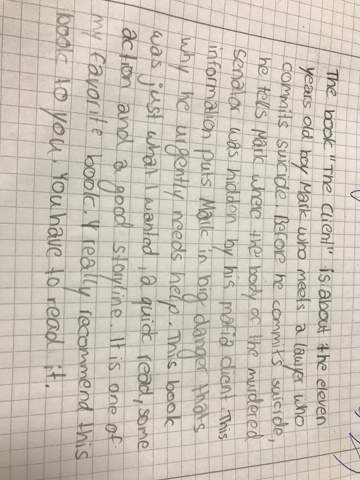Englisch Text verbessern Book review?
Hey:))
Könnte einer von euch bitte meine Book Review verbessern. Im ganzen Text sollte man mindestens ein Mal das passiv benutzen (ich weiß nicht ob ich das benutzt habe) und man sollte gute linking words benutzen. Also falls ihr Rechtschreibfehler, inhaltlich Fehler, Grammatikfehler, Wörter die man mit einem linking words ersetzen könnte und ein Satz findet
dass ich im passiv schreiben könnte dann bitte antworten.:) Ich bedanke mich jetzt schon Mal für alle Antworten<3

Hab den Text extra aufgeschrieben damit es einfach zum verbessern ist:)
The book" The Client" is about the eleven years old boy Mark who meets a lawyer who commits suicide.Before he commits scuicide, he tells Mark where the body of the murdered senator was hidden by his mafia client. This information puts Mark in big danger thats why he urgently needs help. This book was just what I wanted a quick read, some action and a good storyline. Its one of my favorite book. I really recommend this book to you.You have to read it.
3 Antworten

Hallo,
The book" The Client" is about the eleven years old (RS, Grammatik) boy Mark who meets a lawyer who commits suicide. Before he commits scuicide (RS; Wiederholung), he tells Mark where the body of the murdered senator was hidden by his mafia client. This information puts Mark in big (Wort) danger thats (RS) why he urgently needs help. This book was just what I wanted (Komma) a quick read, some action and a good storyline. Its (RS; Grammatik) one of my favorite (= AE; BE = favourite) book. I really recommend this book to you. You have to read it.
Das Fettgedruckte muss korrigiert werden. Ich hoffe, ich habe nichts übersehen.
das Passiv erkennst du wie folgt:
- die Zeit enthält immer eine Form von be und das Past Participle (3. Verbform)
- der Passiv-Satz enthält oft (aber nicht immer) das Wort by
- Das Passiv nennt man im Deutschen auch Leideform, weil das Subjekt etwas 'erleidet', etwas mit dem Subjekt gemacht/getan wird.
- Im Aktiv-Satz dagegen tut/macht das Subjekt aktiv etwas.
Für die Anwendung der Zeiten im Passiv gelten dieselben Regeln und Signalwörter wie im Aktiv.
- Das Passiv funktioniert im Englischen genau wie im Deutschen.
- Im Passiv wird das Subjekt (Wer/Was?) des Aktivsatzes zum Objekt des Passivsatzes und das Objekt (Wen/Was/Wem?) des Aktivsatzes zum Subjekt des Passivsatzes.
Das Passiv wird gebildet mit einer
Form von to be + Past Participle
(bei regelmäßigen Verben: Verb mit –ed; bei unregelmäßigen Verben: 3. Spalte)
Hier Beispiele zu den verschiedenen Zeitformen:
Present simple:
Aktiv: Sie bauen jedes Jahr ein Haus. They (subject) build a house (object) every year.
Passiv: Ein Haus wird jedes Jahr von ihnen gebaut. A house (subject) is built by them (object) every year.
Present Progressive:
A: They are building a house at the moment. P: A house is being built by them at the moment.
Past Simple:
A: They built a house last year. P: A house was built by them last year.
Past Progressive:
A: They were building a house while ... P: A house was being built by them while...
Present Perfect:
A: They have not built a house yet. P: A house has not been built by them yet.
Past Perfect:
A: They moved to Berlin after they had built a house. P: They moved to Berlin after a house had been built by them.
Will-Future:
A: They will build a house next year. P: A house will be built by them next year.
Going to-Future:
A: They are going to build a house next year. P: A house is going to be built by them next year.
Conditional:
A: They would build a house, if... P: A house would be built by them, if...
Nach den Modal/Hilfsverben
must, shall, should, have to, ought to, mustn't, can, can't, will, would, may, might ...
wird das Passive Infinitive verwendet.
Achtung: mit Modal Verben benutzt man den Infinitive ohne to (Ausnahmen: ought to, have to)
Beispiele:
A: We can help her. P: She can be helped by us.
A: You must do your homework. P: Your homework must be done.
A: He may invite us. P: We may be invited by him.
A: Someone ought to help her. P: She ought to be helped.
Das Passiv wird verwendet:
- um hervorzuheben (emphasize):
Wenn der Handelnde (doer) wichtig ist, benutzen wir das by-Objekt.
The washing-up is always done by Dad.
The window was broken by Tom. (not by me!)
- für Zusatzinformationen (further information):
The clothes are made by hand.
This bird can be seen only in the South of Africa.
Das by-Objekt wird nicht benutzt
- wenn der Handelnde nicht wichtig ist oder
- nicht bekannt ist (Subjekt = Somebody, People, Nobody, They …).
Many school things were stolen.
Bikes are stolen nearly daily.
Cigarettes are smoked all over the world.
They speak English all over the world. - English is spoken all over the world.
Somebody helped her. - She was helped.
Präpositionen nicht vergessen!
They looked for the baby. - The baby was looked for.
People shouted at the man. - The man was shouted at.
Nobody slept in this bed last night. - This bed wasn’t slept in last night.
Enthält der Aktivsatz 2 Objekte, kann man 2 Passivsätze bilden:
My husband gave me (1.Objekt) a wonderful ring (2.Objekt).
I was given a wonderful ring by my husband.
A wonderful ring was given to me by my husband.
Achtung! Der 3. Fall wird mit to angehängt.
Grandmother always tells us (1.Objekt) funny stories (2.Objekt).
We are always told funny stories by grandmother.
Funny stories are always told to us by grandmother.
The postman brought me (1.Objekt) a heavy parcel (2.Objekt).
I was brought a heavy parcel.
A heavy parcel was brought to me.
Verben mit zwei Objekten sind: allow, ask, bring, give, make, offer, order, pay, promise, send, show, teach, tell, write
Die Grammatik und Übungen zum Passiv findest du auch im Internet, u.a. bei ego4u.de und bei englisch-hilfen.de.
https://www.youtube.com/watch?v=Im78U76r3NE
-------------------------
Tipps und Wendungen zu book reviews findest du in der Schreibschule bei ego4u;
(ego4u.de/de/cram-up/writing/review)
--------------------------
Für das Vokabular und die Rechtschreibung empfehle ich ein gutes (online) Wörterbuch, z.B. pons.com,
für die Grammatik ego4u.de und englisch-hilfen.de - und Finger weg vom Google Übelsetzer und seinen tr.tteligen Kollegen!
:-) AstridDerPu

Sehr viel Mühe hast du dir da gegeben! Das muss belohnt werden, finde ich! :) Liebe Grüße!

Vielen Dank!!! Ich verstehe nur leider nicht was am Anfang bei elven years old... und bei big falsch ist. Was soll stattdessen da hin?:)

in eine review müssen eigentlich noch Autor, Veröffentlichung etc.
Ausserdem kommt sie mir ziemlich knapp vor. Du hast bis jetzt nur Inhalt zusammengefasst. Es fehlen noch die guten und schlechten Aspekte. Z.B das buch was gut zu verstehen weil / es war spannend weil / es war teilweise anstrengend zu lesen weil...
passiv hast du benutzt :)

stilistisch ist es so vielleicht besser:
the book [...] deals with the eleven-year-old boy Mark, meeting a lawyer who commits suicide.

dann würde ich vielleicht weiterschreiben mit „Before he does so, the lawyer tells Mark....“

Ist schon gut geschrieben mit Passiv ich würde aber anstatt "you have to read it" sowas wie "you won't regret reading it" das klingt viel freundlicher. Außerdem hast du keine linking words reingemacht hier mal ein paar linking words die du mit ein bauen könntest wie du willst :
- First / firstly, second / secondly, third / thirdly etc.
- Next, last, finally.
- In addition, moreover.
- Further / furthermore.
- Another.
- Also.
- In conclusion. (Zb nach needs help)
- To summarise.


Alles klar Danke!! Mich stört beim ersten Satz die zwei who’s könnte ich irgendwie eines davon mit was anderem ersetzen oder so?